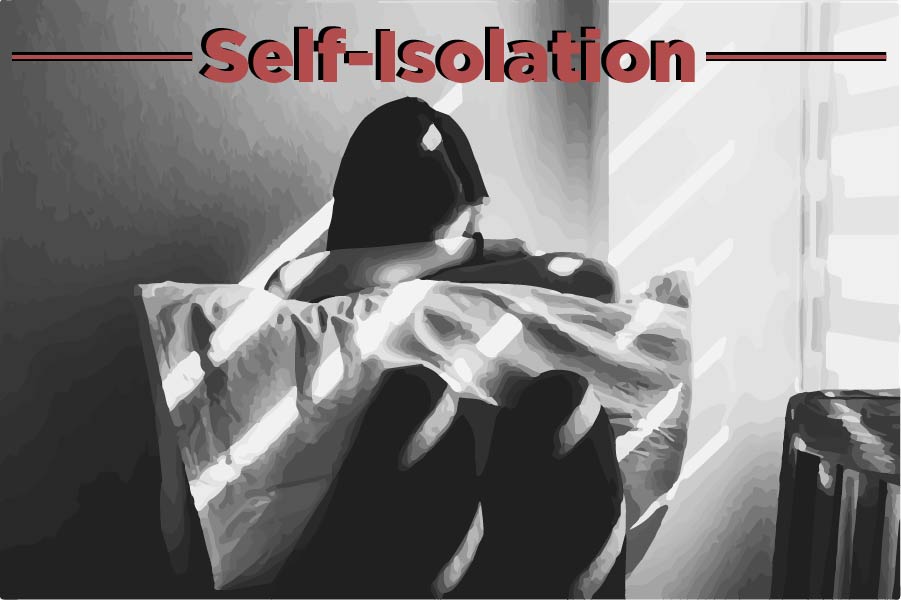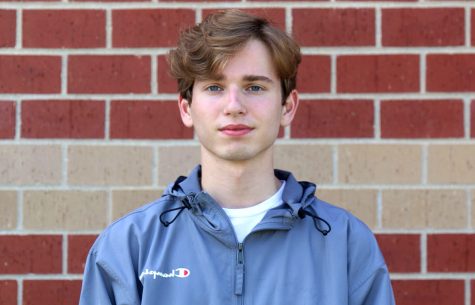Self-isolation hurts high schoolers’ mental health
Many high school students are struggling to cope with the mental health effects of social distancing
By Steven Curto
High schoolers from the district share the effects self isolation has had on their mental health.
March 29, 2020
Following Johnson County’s stay-at-home order, which went into effect Tuesday, March 24, students have been forced to stay home and limit their contact with others to help prevent the spread of the coronavirus. With limited social contact and self-isolation many high school students have seen their mental health declining and struggle with keeping their spirits up.
One such high school student who has found themselves struggling with mental health issues is sophomore Drew Morgan, who has seen his mood shift for the worse.
“Self-isolation has affected my mental health quite a bit,” Morgan said. “I’m overall in a grumpy mood and can’t seem to be happy knowing that this is gonna be a routine thing now.”
With the stay-at-home order, not being able to go out to restaurants or to friends’ houses is something that De Soto junior Sean Ferrel thinks will deeply impact his mental health as he finds immense joy in these activities and is sad that he is no longer able to do them.
“I really enjoy going out and doing stuff with my friends and planning those types of activities, such as going to restaurants together or going to someone’s house to play soccer or video games,” Ferrel said. “Stuff like that motivated me and I found joy from them. Not being able to look forward to those activities is definitely a bummer.”
Although Ferrel believes not seeing friends and not being able to go out will affect his mental health, he hasn’t seen those effects yet as he has been staying in contact with friends via social networking and has been spending time with family.
“I feel like not having that social interaction that we are used to could definitely cause some depression so I have been trying to talk to my family as much as I can. I have also been texting and trying to stay in touch with my friends who I can’t see through social media,” Ferrel said. “Doing stuff like that has really distracted me from any depression, I haven’t experienced any depressive thoughts just because I have a good social network of support from my friends and family. I realize I am very fortunate to have that and I also realize that some kids don’t have that luxury of having a strong social support system.”
Not being able to connect with friends in person has taken a toll on Morgan’s mental health.
“My friends are my support system, and not having that there is a huge shift in not only how I feel in general but how I feel about myself.”
Not being able to hang out with friends has been one of the most challenging parts of the stay-at-home order for sophomore Kellen Hobbs as well, who has been struggling with finding things to do.
“No human contact has had the greatest effect on my mental health because seeing people always feels good, and having that stripped away from you kind of leaves you lost in things to do,” Hobbs said.
While not being able to see friends or her boyfriend has been a challenging part of self isolation for senior Ashley Grega, she has also been struggling with coping with the newfound abundance of time, as she normally keeps herself busy with extracurricular activities.
“I am a very outgoing person and you could say I’m out of the house more than I’m in my house so it’s hard for me not to do anything,” Grega said. “I am also very involved so it’s weird not having something to do at every moment. I like to keep busy, but right now it’s hard to do that with puzzles and video games.”
To help escape from reality and ease mental health issues that have arisen due to self-isolation, Morgan has been working on music.
“To help cope, I’ve been writing music to release some of that stress that comes with not having people to help you through your problems,” Morgan said.
Similar to Morgan, Grega has found comfort during self-isolation through a variety of activities such as journaling and connecting with friends through FaceTime.
“I have FaceTimed my friends and I have been trying to journal where I write my feelings down,” Grega said. “I also am trying to do a daily schedule so I wake up having a plan and don’t waste my day away sleeping and moping around.”
With the district implementing online learning to finish the remainder of the academic semester, Gega feels that she will see a decline in her mental health due to a low self-esteem stemming from being less confident with course work.
“I feel my confidence will decline. I learn better in person or one on one with a teacher and it’ll be harder to do that over chat,” Grega said. “Confidence wise, I feel I’ll struggle in my classes more because I’m outside of the normal classroom environment.”
When it comes to continuous learning, Ferrel, like Grega, thinks he may see a decline in his mental health as he enjoys connecting with teachers and peers in person at school, but he is also hopeful that staying in touch with friends and family via social media will help keep him in a healthy mental state.
“I feel like not having in-person classes definitely will affect me. I personally look forward to seeing my fellow classmates and teachers and enjoy conversing with them,” Ferrel said. “I know as far as mental health is concerned it is going to be difficult for me to stay at peak mental fitness; but like I said having the social network support that I have will definitely well help through the next couple of months.”











